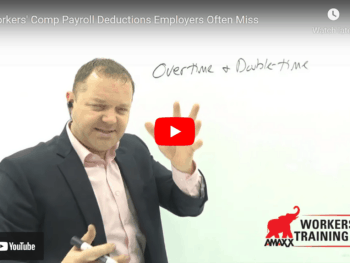
In any workers’ compensation claim, one of the most important issues that needs to be determined upon the onset of an investigation is the employee’s average weekly wage. The average weekly wage serves as the basis for the determination of a number of workers’ compensation benefits entitled to an injured worker in most jurisdictions, which include Temporary Total Disability, Temporary Partial Disability, Permanent Partial Disability and Permanent Total Disability benefits. If an average weekly wage is not accurately calculated from the onset, it can lead to a number of issues, which may delay or impede settlement, serve as a basis for underpayment of claims, or penalties should the claim become contentious.
Never Rely Upon the First Report of Injury
One of the first documents received by a claims handler at the inception of a claim is typically a First Report of Injury or a similar document. Often times, this is a pleading completed by either the employee or the employer, and almost without exception contains inaccurate information about the employee’s average weekly wage. In other instances, the average weekly wage is left blank, which causes further questions about what the average weekly wage is, and can result in incorrect benefits being paid.
Click Link to Access Free PDF Download
“Workers’ Comp Claims Review Checklist: 9 Must-Have, Serious-Impact Elements”
Obtaining accurate information to calculate the average weekly wage can often be received as follows:
o Collect payroll records from the employer(s);
o Use a recorded statement or deposition to receive information directly from the employee regarding the number of hours per week they are working, the number of weeks they have worked prior to the injury, their method of payment, information concerning vacation time and paid time off; and
o Remember that construction workers or employees who work outside may be subject to different rules regarding the calculation of the average weekly wage.
Understand the Difference Between “Regular” or “Irregular” Employment
Every jurisdiction has different rules concerning the calculation of the average weekly wage and their definitions of “regular” and “irregular” employment. If this is the case, an initial analysis must be made to determine the employee’s classification.
o “Regular” employment typically occurs in instances where the injured worker has worked the same amount of time in the 26 (or 52) weeks prior to the work injury. If employment is regular, the calculation to determine an average weekly wage is quite simple.
o “Irregular” employees have a variance in earnings from week to week, as well as the hours that they work. This typically arises in instances where an employee has worked varying hours depending upon their job duties or has had periods of excessive absenteeism.
There are also a number of other issues that come into play when calculating an accurate average weekly wage. These issues include, but are not limited to, the following:
- Bonuses: Courts have usually held that performance bonuses based upon attendance at work to be includable in the average weekly wage.
- Part-time/Additional jobs: Due to tough economic times, it is becoming more common to find injured workers who work more than one job. As a result, even though an employee did not sustain an injury while working for one employer, it does not necessarily exclude the wages he or she earns in the final average weekly wage calculation. Courts will usually examine if the employee was (1) regularly employed by two or more employers, and (2) that employment was taking place “at the time of the injury.” In order for someone to be “regularly employed” the courts have scrutinized whether there was a continuing engagement to serve an employer in their business at that time.
- Winter lay-offs and construction seasons: Employment in construction, mining and seasonal work presents a whole host of problems for determining an accurate average weekly wage. Most states have special rules when dealing with workers who have membership in specialized labor unions. States have adapted their workers’ compensation laws that generally allow for these types of workers to have their average weekly wage computed under special terms and formulas.
Conclusions
Careful consideration must be taken during the initial investigation of the unique circumstances surrounding the injured worker’s employment in order to accurately calculate an average weekly wage.

Author Michael Stack, CEO Amaxx LLC. He is an expert in workers’ compensation cost containment systems and helps employers reduce their workers’ comp costs by 20% to 50%. He works as a consultant to large and mid-market clients, is a co-author of Your Ultimate Guide To Mastering Workers Comp Costs, a comprehensive step-by-step manual of cost containment strategies based on hands-on field experience, and is founder & lead trainer of Amaxx Workers’ Comp Training Center , which offers the Certified Master of Workers’ Compensation national designation.
Contact: mstack@reduceyourworkerscomp.com.
Workers’ Comp Roundup Blog: https://blog.reduceyourworkerscomp.com/
©2020 Amaxx LLC. All rights reserved under International Copyright Law.
Do not use this information without independent verification. All state laws vary. You should consult with your insurance broker, attorney, or qualified professional.



























